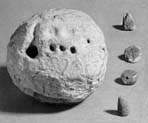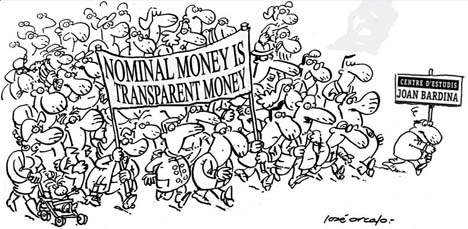|
New!
The group debts
Brauli Tamarit Tamarit.
Some speak about the spiritual laws of cause and effect. Are they just for individuals or also for the community? (...).
Read document
Gemma Anglada, from “Veganitza’t”: “It offers a world of possibilities, it is pure alchemy”.
Llibertat.cat.
An interview to Gemma Anglada, a cook, and in charge of “Veganitza’t” (Avinguda Costa Brava, 18, at Corçà, on the Road of Palamós) (...).
Read interview
The best president of Argentina: a historical article on Arturo Illia.
Pablo Mendelevich. La Nación. Argentina. The club of lost books.
35 years ago, on January 18, 1983, died in poverty the former President Arturo Illia. Being a doctor, he spent his last days working in a friend’s bakery, since he had renounced his retirement (...).
Read document
Letter to an armed policeman.
Lluís Maria Xirinacs.
Barcelona 21st March, 1976. In front of the local prison «La Modelo». Entença Street. To an armed policeman (...).
Read document
The Earth Independence.
Brauli Tamarit Tamarit.
Lluís Maria Xirinacs taught us to look for knowledge in the different areas of reality, excluding none. From his thorough study of reality (...).
Read document
«Debt Or Life», English version.
Auditoría Ciudadana (Citizen Audit).
#DebtOrLife, English version. Debts have to be always paid? What is debt? (...).
See the video
Reforestation of the woods. The experience in the Italian Tyrol.
Agustí Chalaux de Subirà.
In the Tyrol Italian applied a system of responsible reafforestation and at which appended later the particular owners.
Read document
Did you ever hear about Curitiba?
The Sunday Chocolate of Dario Fo, Franca Rame & Jacopo Fo.
A history of how architect and mayor Jaime Lerner transformed with his honesty and ingenuity the Brazilian town of Curitiba in a solidary traffic island.
Read document
The language school of the Bordeaux doctor.
Agustí Chalaux de Subirà.
A typical example of learning while playing is that of a doctor from Bordeaux, who became famous at the beginning of the twentieth century. This doctor, which was known by all as a devout Catholic, once went to (...)
Read document
The game of the four family groups.
Libération. François Feron.
In the «trunk» family we find Germany, Austria, Ireland... In the «communal» family, Tuscany and Finland... Historian and demographer Emmanuel Todd, in a book which appeared yesterday in France, suggests a new distribution of Europe, based on (...)
Read document
Solidary light bulbs.
Teresa Sala Bernaus. Llibertat.cat.
Benito Muros was a tradesman who was afraid of flying. To overcome his fear he obtained a pilot’s certificate in civil aviation. In a trip to the USA with his family he travelled to California and went by the fire brigade at Livermore, where there is a (...).
Read document
Money and constitution.
The Centre d’Estudis Joan Bardina Team.
«I believe that banking institutions are more dangerous to our liberties than standing armies. If the American people ever allow private banks to control the issue of their currency (...)».
Read document (HTML)
 Read and / or download (PDF) Read and / or download (PDF)
Two interviews to Martin Armstrong. The Forecaster.
La Vanguardia. Die Welt.
Martin Armstrong, an independent consultant who has improved the study of the economic cycles by Kondratiev, had already foretold that the birth of the euro carried in it the seed of its own destruction, because it dealt only with a monetary union without a tax union and a debt union. Or, to say it in other words, without including the public possibility of inventing and disinventing money without bringing about debt (...).
Read interviews
Varoufakis admits plans for parallel payment system, denies Grexit goal.
La Vanguardia.
According to Joan Casals (1925-1988), and also following Jordi Griera, the less productive European states, like Greece (...).
Read document
Let us imagine the Iberian Peninsula occupied by the French.
The whole of the Iberian Peninsula was occupied by the French after the Napoleonic wars. This specific war finished when Napoleon conquered the city of Cadiz, after a 14 months siege, on 11th September 1814 (...).
Read document
Monetary sovereignty, the mother of all sovereignties. (...Or what we should expect from #Salvados program).
Enric Duran Giralt.
The Society of the Spectacle has these things to give us a show about two people who have faced the banking system and the status quo staging it as another episode in the war between different television audiences. Therefore, (...).
Read document
The European tax disunion.
Joan Casals.
 Shocking things happen within public opinion: one of them is that, very often, the greatest contradictions are the most overlooked, and the other is that the most debatable matters fall into such a deep oblivion that people even lose sensitiveness towards any similar matter which may again appear (...). Shocking things happen within public opinion: one of them is that, very often, the greatest contradictions are the most overlooked, and the other is that the most debatable matters fall into such a deep oblivion that people even lose sensitiveness towards any similar matter which may again appear (...).
Read document
Cartoon by Jaume Perich on communism and capitalism.
Read document
International economists in favor of a parallel currency.
Declaration regarding «Parallel currencies» discussed during the BVMW workshop «Parallel currencies – options, chances, risks», Berlin, July 24, 2012 (...).
Read document
The first lawful state in the world.
«We have a lawful state». This is the affirmation made by some politicians, public officials, jurists, military men, etc. when they talk about their own country, especially in the present day parliamentary systems (...).
Read document
Semitic legends concerning the bank.
Agustí Chalaux de Subirà.
Barcelona, 22nd February 1990.
Agustí Chalaux tries to summarize all that he learned as a teenager and as a young man from a great friend, who was also an eminent banker.
Read conference
Reckoning Before Writing.
Denise Schmandt-Besserat.
The tokens from Tepe Asiab may be considered an elaboration of a system of counting based on pebbles. The novelty was to use clay for the manufacture of the counters, permitting one to model the tokens into various shapes and to assign each form a particular meaning. Thus, the counters became a more previse memory aid since not only conferred the quantity but also the specific nature of the commodities recorded.
Read document
Two Precursors of Writing: Plain and Complex Tokens.
Denise Schmandt-Besserat.
Before the Sumerian writing system —the first script ever developed— was invented at the end of the fourth millennium B.C., accounting was practiced in the ancient Middle East by means of small counters. These were small tokens modeled in clay in different shapes, each symbolizing a particular commodity. The token system consisted of two kinds of tokens— «plain» and «complex» (...).
Read document
The Earliest Precursor of Writing.
by Denise Schmandt-Besserat.
Before the Sumerians invented writing, in Southwest Asia are carried the accounts by clay tokens of various distinctive format. Apparently these tokens originated Sumerian ideograms.
Read document
Numbers and Measures in the Earliest Written Records.
by Jöran Friberg.
As early as the end of the fourth mlllennium B. C. proto-Sumerian and proto-Elamite scribes had well-developed systems of numbers and measures. They included precursors of our own decimal system (...).
Read document
The political planetary pyramid.
Alexandre Deulofeu (1903-1978) said that all the peoples on earth live within cultures which go through alternate phases, first of fragmentation and then of unification. The true new artistic, philosophical and scientific creation (...).
Read document
Deconstructing the pitfalls of money.
First, I fully share the concern expressed by different individuals and groups about the possibility that the establishment of an exclusively electronic money may become the trap of an electronic tyranny, under the control of a minority which does not report to anyone (...).
Read document
A short history of money.
Agustí Chalaux de Subirà, Brauli Tamarit Tamarit.
 A short text explaining the history of money. Originally, it
was an instrument which aided commerce and favoured responsibility.
Later, it changed, permitting corruption. In view of this, a money
system using modern technology and which once again favours responsibility,
is proposed. A short text explaining the history of money. Originally, it
was an instrument which aided commerce and favoured responsibility.
Later, it changed, permitting corruption. In view of this, a money
system using modern technology and which once again favours responsibility,
is proposed.
Read document
Essay on currency, market and society.
Magdalena Grau Figueras, Agustí Chalaux de Subirà.
A
book in which a new economic and political model is proposed,
based on a transparent and responsible market, the minimisation
of power over individuals and the creation of a society with
less misery and corruption.
Read the book
Original interview to Jordi Griera in USA Today.
Original text of the interview ofUSA Today to Jordi Griera, before to be modified and published in 20th february 2013.
Read interview
The
outstanding challenges of Alexandre Deulofeu and their solutions,
according to Agustí Chalaux.
Brauli Tamarit. Presentation Martí Olivella.
In this article Brauli
Tamarit introduces us to two universal Catalans of the 20th
century which have passed unnoticed, because they dared
to challenge the «politically correct» thought
trends. He not only introduces us to their amazing biographies
and to their unorthodox theories, but tries to establish
a link between the questions and answers they formulated.
Read the text
|





 Shocking things happen within public opinion: one of them is that, very often, the greatest contradictions are the most overlooked, and the other is that the most debatable matters fall into such a deep oblivion that people even lose sensitiveness towards any similar matter which may again appear (...).
Shocking things happen within public opinion: one of them is that, very often, the greatest contradictions are the most overlooked, and the other is that the most debatable matters fall into such a deep oblivion that people even lose sensitiveness towards any similar matter which may again appear (...). A short text explaining the history of money. Originally, it
was an instrument which aided commerce and favoured responsibility.
Later, it changed, permitting corruption. In view of this, a money
system using modern technology and which once again favours responsibility,
is proposed.
A short text explaining the history of money. Originally, it
was an instrument which aided commerce and favoured responsibility.
Later, it changed, permitting corruption. In view of this, a money
system using modern technology and which once again favours responsibility,
is proposed.
